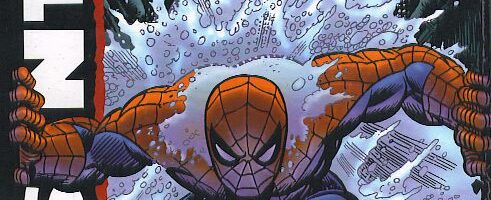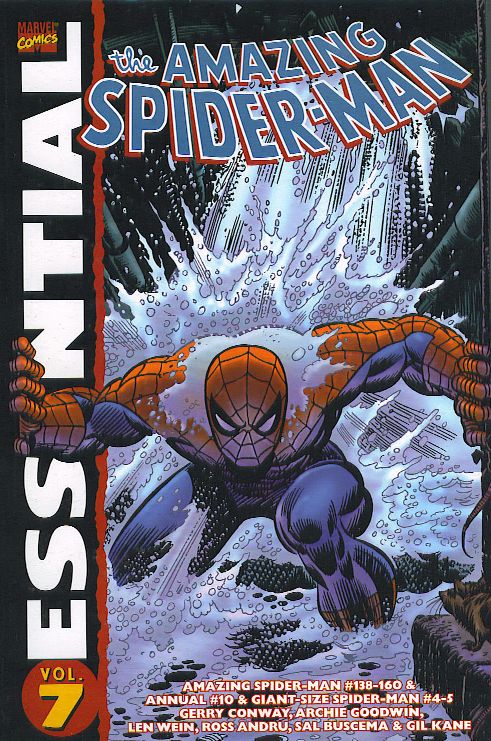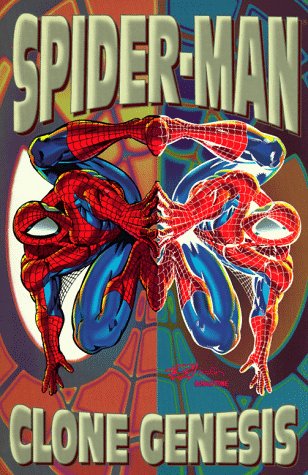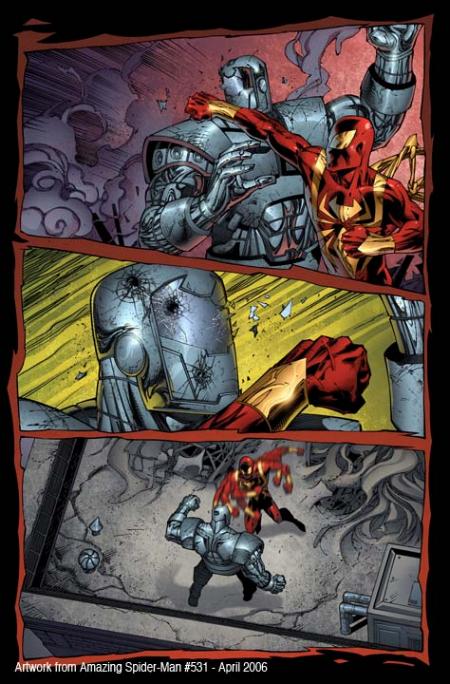[You can find this column, which Greg posted on 2 June 2006, here, and it says something about the heady, early days of blogging that this relatively non-controversial subject got 51 (!!!) comments. Man, remember when we all had time to debate on the internet? I mean, a lot of this was T., being argumentative as usual, but hey, there’s Bill Reed and Mike Loughlin showing up as well! Enjoy!]
So I hit on this swell new theory of superhero comics and their fans this week and the more I think about it, the more I think it really explains everything that has been annoying me about DC, Marvel, and fans the last few years.
Earlier this week I got Essential Spider-Man volume seven in the mail and that’s what I spent most of the week reading. Since it was from what I consider to be “my” era of Marvel, the early-to-middle 1970’s (well, really, I think of it as the “after the grocery store within walking distance installed a comics rack, suddenly I didn’t have to have a parent DRIVE me anywhere to get comics” era) I loved it.
It provoked a lot of pleasant memories for me, as rereading the 70’s Marvel books always does. I loved that era, and don’t discount the importance of that grocery store, because it played a key role in what I bought and read. Not only did I read a lot more comics — duh — but, more importantly, suddenly I didn’t have to fear continued stories any more, I could actually follow a book. That was a big deal for me. It literally changed the WAY I read comics.
Reading the Essentials from that era now, though, it really jumps out that those comics were never meant to be collected in book form. They were specifically designed to be read AS serialized monthly magazines. Stories were two- or three-parters at most, usually; anything over five parts was an Epic. The original Clone Saga that is contained in this Essential volume, and that I remember at the time as feeling like it took FOREVER to unspool in Amazing Spider-Man, actually only ran about eight issues. And I wasn’t even able to get all of it back then, but I had no problem keeping up. Every issue made it clear that the Jackal was behind the whole thing, that his identity was a mystery but that he was someone close to Peter Parker, that he had something to do with Gwen Stacy … and at the same time, the conflict got escalated and the story moved forward. Serialization 101.
Anyway, so I was thinking about Gerry Conway, what an underrated writer he was, and what a really radical run he had on Amazing Spider-Man in the 1970’s. And I remembered an interview he had done with The Comics Journal back in the 80’s sometime, where he said something like “Here’s the thing. Superheroes, in fact any series character, they aren’t supposed to change. They’re supposed to have the ILLUSION of change. The trouble is there was me and all these other guys who came into the business in the 70’s and we were all excited about the potential of comics and we were all radical and we made the mistake of actually instituting REAL change.” Remember, this is the guy who killed Gwen Stacy, he knows what he’s talking about. And he went on to point out the long-term damage that this “REAL change” had done to characters like Spider-Man and Superman and Batman, and how writers had been trying to backpedal off those changes ever since.
I recall that Conway also suggested in this interview that superhero comics are ephemeral entertainment, about on a par with series TV, and often read on the john. The Journal reacted with a kind of editorial outrage, as it always did, putting those quotes in big call-out inserts that magazines sometimes use to break up an all-text page, with the clear implication that Conway was some sort of heretic for saying these things. But the ugly truth is, they actually make a lot of sense.
So anyway, this was all preamble. This was what was floating around in my mind while I was reading Conway’s old stories this week, and sort of half-consciously noting all the “real changes” he made to Peter Parker.
Then I went and picked up my regular pull-list stuff from the shop and man, compared to what people are doing in comics THESE days in terms of Real Change, Conway was a piker. Looking at Spider-Man this week really put this idea over the top. Think about it. How many REAL changes have been made to Spider-Man in the last three or four years? The Avengers. The new armored costume. Aunt May finding out the secret. “Sins Past.” Peter teaching school. On and on. And now all this Civil War tie-in stuff with Spider-Man about to unmask in front of Congress.
I got to that cliffhanger and my first thought was, “No way. Straczynski will find a way to doubletalk Peter out of doing it.” and then I thought for another minute about all the other changes, the Real Changes, in the last decade or so, and my second reaction was, “Oh, damn it. He might not. He might have decided to really dispense with the secret identity. Oh man, that would be so wrong, what an insane blunder, don’t do that …”
And I remembered what Gerry Conway had said, years ago, about the illusion of change vs. real change to characters in serial fiction, and that was when it dawned on me why fans are all so pissed off at each other and at publishers all the time, any more.
Here’s the thing. There’s two groups of fans reading superhero comics right now, the illusion-of-change fans and the real-change fans, and each one is absolutely convinced that the other group is going to destroy their beloved superheroes. And it terrifies them, because they both love comics fiercely, and neither can stand the idea that they might get taken away. So each group is constantly yelling at the other to for Christ’s sake STOP it, d’you have any idea what you’re doing? I suspect that this underlies a lot of that free-floating fan anger out there. This is why so many comic book message boards have the social niceties of Mad Max’s Thunderdome.
The illusion-of-change people are looking at it this way: I discovered DC and Marvel at ___ age and it changed my life, these characters are great, timeless icons, new readers need to be able to discover them the way I did, why are they so hell-bent on ruining them when they do stuff like make Spider-Man an armored Avenger or marry off Superman to Lois Lane or … (fill in your own premise-altering Real Change here) … comics are already practically incomprehensible to new readers, the base is going to keep shrinking, pretty soon there’s only going to be about six people reading DC and Marvel, they’re KILLING COMICS!
The real-change people, on the other hand, probably came into comics sometime in the late 80’s or so. Post-Crisis, let’s say. Real change is what they’re used to. It’s what they have come to expect. Their tastes were formed by Chris Claremont on the X-Men, or Peter David on the Hulk, or Alan Moore on whoever. These were guys that specialized in real changes that often completely changed the premise of whatever strip they were working on. So the real-change people think: Damn, why is it that superhero publishers are so cowardly! Quit with the retcons already! Dead is dead! Show some guts! Comics are finally starting to Grow Up! They’re not for kids any more! We don’t need to worry about some mythical eight-year-old coming into the comics store, you idiots, there’s no one under twenty in any comics store I’ve ever been in! You let these old-school geezers hit the reset button all the time like they want to and they’ll be KILLING COMICS!
Personally, I lean towards the old-school, illusion-of-change kind of superhero writing. You know, I pick up a Batman book, I want to see Batman being tough and cool, doing a little detective work, driving the Batmobile and doing lab work in the Batcave, scaring the hell out of and then subsequently punching out a few thugs, responding to the Bat Signal, and defeating a grotesque mastermind who commits crimes according to some psycho theme. I expect it to take place at night and I expect to see Alfred the butler and Wayne Manor and maybe Robin. I don’t see those things — like, for instance, when Batman was about the adventures of an armored nut in a Batcape named Jean-Paul Valley, or when all the Bat-books were riffing on Escape From New York with Batman playing Snake Plissken — and I am disconcerted and annoyed. It throws me. And then when the status quo is restored to what I know and love from my youth, I feel vindicated and satisfied, but the Real Change group gets upset. Back and forth the pendulum swings.
I can appreciate where the real-change fans are coming from. I think you get to see some real interesting work that you don’t get otherwise — I wouldn’t give up the Alan Moore Swamp Thing for anything — but realistically, I think it really is bad for comics long-term. Because Conway was right. Real change for serialized fictional adventure characters is usually a bad idea. Sooner or later, what ends up happening is we have some sort of reboot, or retcon, or, God help us, a Crisis, to straighten it all out. Not to mention, as our other Greg points out in his excellent examination of the consequences to Identity Crisis a couple of posts down [Edit: he’s talking about this one, I’m fairly certain], that sometimes you end up doing the kind of damage to the basic character idea that it’s almost impossible to back off of, short of starting a whole new line of comics. Which, oddly enough, is the solution we seem to be seeing now with the Ultimate and All-Star lines. And even THOSE are managing to piss off half the audience at any given time.
You want real change and growth from your characters, on the whole, I think it’s better off to start fresh with original ones than to put Superman in an electric-blue ski outfit or turn Hal Jordan into an evil demigod and get some Gen X slacker to be the new Green Lantern. Or even trying to get back to basics with “the goddamn Batman.” On the whole, I’d leave the big-name icons alone. Because messing with them and then backpedaling off it is what has half your audience mad at you at any given time, and whether or not it’s actually ‘killing comics,’ it can’t really be good for them.
See you next week.





I’d argue that Spider-Man was a real-change book until 1999 or so. Even under Lee, he goes from high school to college, Peter Parker evolves as a character, his status quo shifts over time. When I came in, back in the early ’90s, he was still recognizably Spider-Man, but he was also married to Mary Jane. But in 1999 when they did the first renumbering and walked back Aunt May’s death and got rid of baby May, that’s when the character and the book stopped growing. And since then, stuff like the marriage has also been walked back. All the “real change” stuff Greg mentions here was undone. The new trick is for a writer to introduce a big status quo change, and then reverse it by the end of their run. I’m not saying there haven’t been good Spider-Man comics in the last 25 years. But overall the series is stagnant. And this applies to other characters, too.
DC is way more loosey-goosey with its continuity, as stuff ebbs and flows in and out of canon. But Marvel stopped feeling like a progressing story a while back. And I suspect the Cinematic Universe is about to run into the same problem.
I HATE the whole “Well I made changes but it was only fair to the next writer to put all the toys back in the same toybox where I found them.” Let the other writer fix things if they want, but maybe they don’t.
I think I’m more real change. I was happy with Wally becoming Flash and okay with Kyle and Connor. I agree a lot of real change sucks, like the Bat-stuff he mentions — except that wasn’t real change. I never thought for a minute that Jean-Paul was going to stay Batman (of all the various illusions of change “let’s put someone else in the superhero’s costume” is my least favorite).
Ending Peter’s marriage is probably the worst “real change” I can remember. Hated it at the time; now that I’m married Peter’s “Sorry MJ, I love my mom figure more” pisses me off royally (no matter how they massaged the story so that OMG It’s His Fault!!).
That said, I do think if you’ve got a set-up that works, just telling good stories and not trying to do anything drastic is acceptable. I hate the whole idea that “stories have to matter” — it’s okay if all Batman (or whoever) does is have a colorful, entertaining battle and save a few lives and nothing Changes Him Forever.
Yeah, at this point every story has to “matter,” and the end result is that the stories don’t matter. I’ve mentioned before how it’s tiring for Gotham or Metropolis to be destroyed every week.
I liked that DC, for example, tried to move the “legacies” forward in the 90s. I loved Wally, liked Kyle, etc. But then they brign back the previous generation, and introduce a further new generation– Damian, Jon, new GLs, new Kid Flashes. We can’t move forward, but we allow the illusion of it, and now the series and universes are overstuffed.
I don’t really have a solution! But it’s worth chewing over.
Well, I’m not a Spidey fan, so I never cared what happened there. He was still whining, constantly.
I don’t mind it either way, so long as the story is good. I think people tend to get ticked off when the story is mediocre to bad, when it was good, not that log ago. If it’ been bad for a long time, they tend to welcome any change. I think they also recognize change for the sake of a sales spike.
I tend to agree that too much radical change with a serialized character tends to be damaging, though I do think you can make changes and have them be permanent, if you are true to the core concept. Tarzan and John Carter had kids and they would go on to have their adventures.
I tend to see people get more upset with the “Everything you know is wrong” changes, that treat readers like they were morons to buy into the past stories.
One of the reasons why I pretty much stopped reading mist modern superhero comics was that the stories were being repeated. That isn’t necessarily something new; but I’ve been reading comics for over 50 years and you see this stuff cycle through and you get bored with it, unless the writer has a clever new hook. Otherwise, you just find yourself going, “Been there, read that. Next!”
I like it when the writer has an idea to expand upon what we know, blending the past with a new story or a new point of view to that past story. James Robinson was good at this, In Starman and Ed Brubaker, when he did The Marvels Project. Robinson kind of expanded upon the “in-between years” and explored family and friends, while focusing on a new generation. Brubaker, in Marvels Project, kind of added the POV of some of the lesser heroes from Timely, while trying to establish some continuity between what Timely had published, and Silver and Bronze Age revisions, making the Super Soldier Formula a sort of maguffin (not that he was alone in that, as the Ultimate line did similar). He added the perspective of The Angel, one of the Original 3 heroes, but the least known, as he was barely ever used after the 1940s, while his name was swiped for an X-Man. We got to see his story, had a link to the past Marvel history (via the Two-Gun Kid, who was a patient, at the end of his life) and had him working at the outskirts of the main conflict, encountering other “lesser heroes, like some of those used in The Twelve. That was some interesting stuff that didn’t tear up the past, yet added some interesting material to it and set up potential payoffs in the present and future. It added to things, instead of trying to burn them down and build a new house on the ashes.
“One of the reasons why I pretty much stopped reading mist modern superhero comics was that the stories were being repeated.” This is a problem for me too at times.